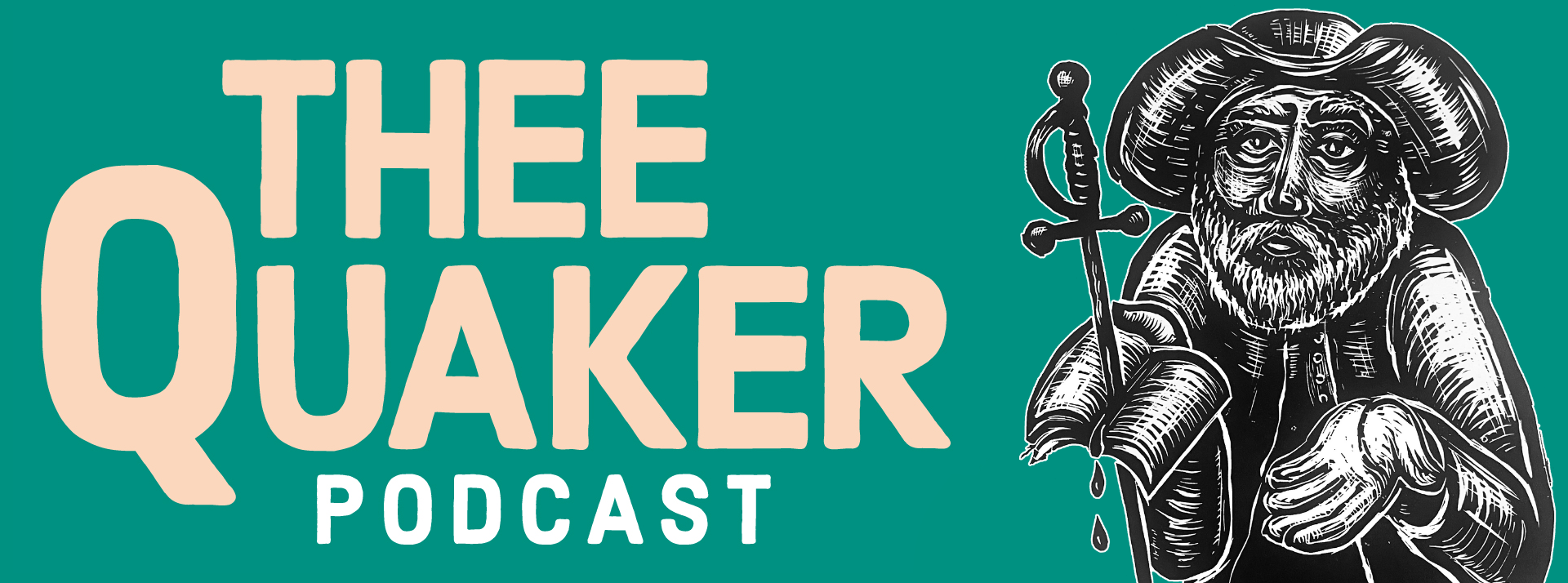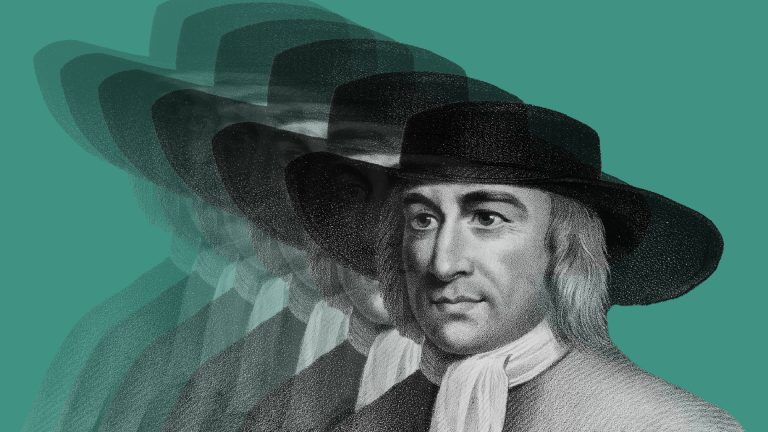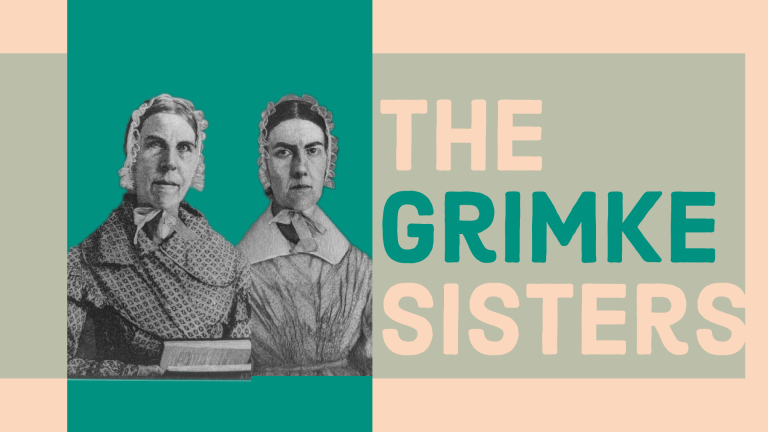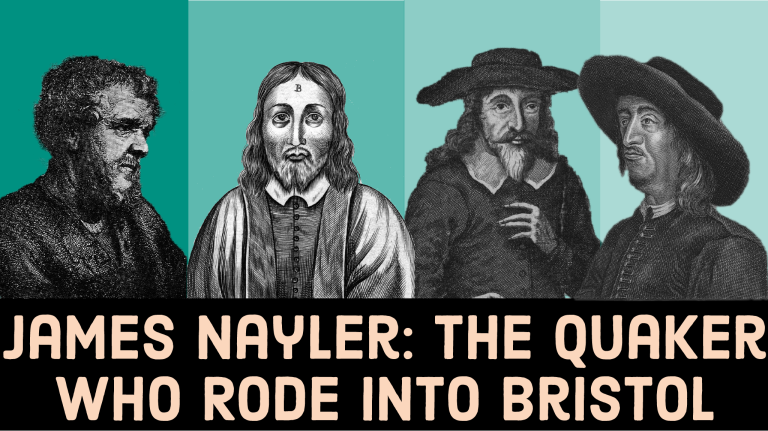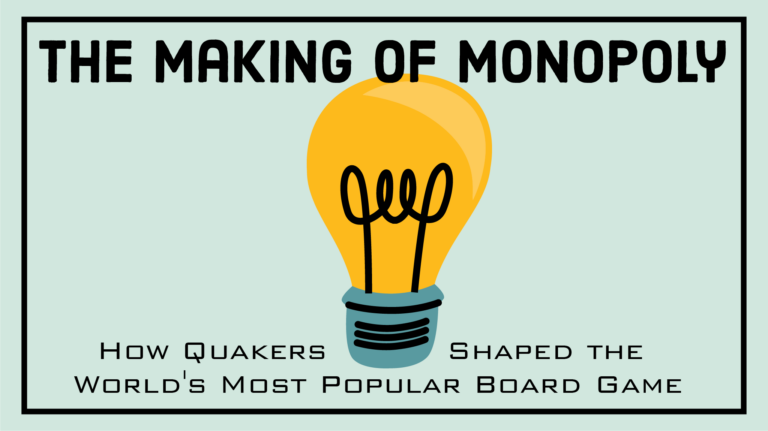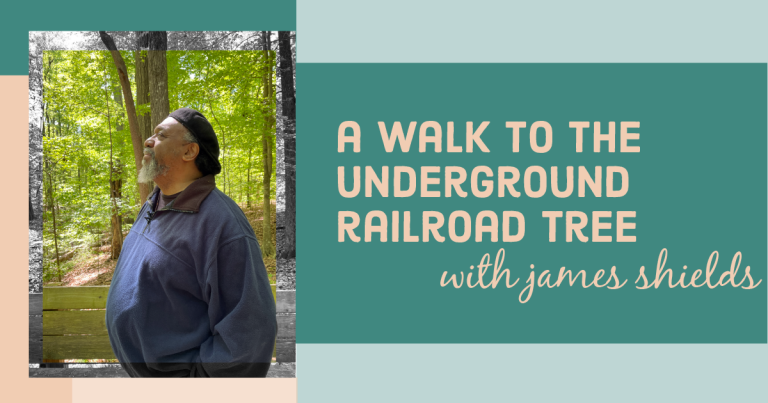Benjamin Lay: The Quaker Abolitionist That History Forgot
Benjamin Lay was a fierce abolitionist whose dramatic protests against slavery embarrassed the powerful Quakers of his day. They kicked him out and tried to erase him. This is the story of his return.
Marcus Rediker’s Books: https://www.marcusrediker.com/books/
Abington Monthly Meeting’s Efforts Towards Reconciliation: https://www.abingtonquakers.org/Groups/380563/Benjamin_Lay_Reconciliation.aspx
Subscribe so you don’t miss an episode!
Leave a comment below to share your stories and thoughts!
DISCUSSION QUESTIONS:
- The podcast presents Benjamin Lay as both a “troublemaker” and a “prophet”. Actor Mark Povinelli wonders if, today, we would just see Lay as a man shouting on a street corner and sideline him as “insane”. In our own time, how do we distinguish between a prophetic voice and a fanatic?
- Lay was deeply concerned that wealth was corrupting the soul of Quakerism. Loretta Fox states that “You cannot uphold the Quaker testimonies and still enslave other people”. When an individual believes their own community or institution is violating its core principles, what is their responsibility?
- Lay practiced a radical boycott of all goods produced by slave labor. He famously smashed his late wife’s teacups to protest the exploitative sugar and tea industries , arguing that to consume these products was to drink the blood of the enslaved. How does this challenge you to think about the “chains of exploitation” connected to the products you consume today?
Jon Watts
Hi dear listeners, it’s Jon here. We have an amazing episode for you today so I’m going to keep this brief. Today’s episode is about Benjamin Lay, a Quaker who was ahead of his time in naming that our possessions and consumption habits are inextricably linked to oppression and exploitation. Without spoiling the show, I’m just going to say it had something to do with smashing teacups in the 1700’s.
Well Friends, if you support the show, we’d like to send you a teacup to smash. Or sip your coffee out of it for a while, then smash it. Or sip coffee and think about all the things you’d like to smash. Whatever you decide to do with it, we want you to know it is responsibly sourced. And now through the end of September, if you go to quakerpodcast.com and hit the button that says support, we’ll send you this one-of-a-kind, limited edition Benjamin Lay mug.
Also, your support means a lot. We literally could not make this show without it. That’s Quakerpodcast.com and hit support. Thank you, and here’s the show.
Zack Jackson:September 19th 1738. Burlington, New Jersey.
Sunlight streams through the plain glass windows of an unadorned Quaker Meetinghouse. Men in their broad brimmed hats. Women in their bonnets. They sit on hard, unforgiving benches, waiting for the Spirit to move them. This is the Philadelphia Yearly Meeting, the most important gathering of Quakers in the colonies. The guiding principle is peace. Order. A quiet, inner light.
But one man is not at peace.
He is a little over four feet tall, with a hunched back, protruding chest, and legs that seemed almost too thin to support his body. His name is Benjamin Lay. To many here, he is a troublemaker. A fanatic. A thorn in the side of the community. To others, he is a prophet, a man with the courage to speak truth to power and to actually live into the radical teachings of Jesus. He wears clothes he spun and sewed himself, a protest against the products of slave labor. Today, he carries a book. And a secret.
He rises.
The collective breath of the room catches. All eyes turn to the cloaked man standing in the aisle. He holds up the book, a symbol of truth and tradition.
His voice, with disarming clarity, cracks through the silence like a whip.
Mark Povinelli: Now all you Negro masters who are contentedly holding your fellow creatures in a state of slavery during life, well knowing the cruel sufferings those innocent captives undergo in their state of bondage, and especially you, who profess to do unto all men as ye would they should do unto you, And yet in direct opposition to every principle of reason, humanity and religion, you are forcibly retaining your fellow men from one generation to another in a state of unconditional servitude. You might as well throw off the plain coat as I do…
Zack Jackson: He throws off his greatcoat, revealing a military uniform underneath. A sword hangs at his side. Gasps ripple through the meeting. This is an abomination. A weapon of violence in a house of peace. Before anyone can react, he raises the book high. His voice thunders.
Mark Povinelli: Thus shall God shed the blood of those persons who enslave their fellow creatures!
Zack Jackson: He plunges the sword deep into the book.
And it bleeds.
A shockingly bright, crimson liquid bursts from the hollowed out pages, spattering the white clothes and shocked faces of the Friends sitting in the front rows. It looks, for all the world, like blood. The blood of the enslaved, now staining the pristine garments of the righteous.
It was a bladder, filled with red pokeberry juice, hidden inside a hollowed out book. But the message was unmistakable. This was one of the most radical, theatrical, and unforgettable acts of protest in American history. And it happened nearly 150 years before the Emancipation Proclamation.
Who was this man, Benjamin Lay? The vegetarian, feminist, and fierce abolitionist who used guerilla theater to shame the institution of slavery? And why has his story been largely forgotten?
Benjamin’s History
Zack Jackson: To understand the man, you have to understand his world, and the many forces that shaped him. Here’s historian Marcus Rediker.
Marcus Rediker: Benjamin Lay was born in Copford, England in 1682 he was born to a Quaker family. He was actually a third generation Quaker. His grandparents had converted to Quakerism, probably soon after 1655 when there were a number of very powerful Quakers in the area around Colchester. So he grew up with Quaker training. But it turns out, he was much more devout and much more radical than anyone else in his family. But Benjamin had a restless spirit, so after his father apprenticed him to a Glover to use animal skins to make gloves, he rejected that he didn’t like that line of work. It was a dirty trade. It involved killing animals, and he ran away to London to become a sailor, to see the world.
Zack Jackson: Life as a sailor was, in many ways, a crash course on international politics.
Marcus Rediker: Here at sea, he worked with people from all around the world. Ships were known for their Motley crews, and so Benjamin learned very important lessons about solidarity, a very high level of solidarity among sailors, because this was a dangerous line of work. But he retained this identity as a common sailor for the rest of his life. He was referring to himself as a common sailor decades after he had left the sea. So it left this indelible print in terms of who he was and how he thought about himself.
Zack Jackson: He left the sea in 1718 when he married Sarah Smith, another Quaker and a little person like himself. And that same year, they made a decision that would change everything.
Marcus Rediker: The second big thing that happened and turned him into the abolitionist he became was that in 1718 he and Sarah sailed to Barbados and opened a little shop on the waterfront in Bridgetown, and here Benjamin came face to face with slavery, and what was probably, at the time, the leading slave society in the world, and one of the most brutal and the enslaved people would come into his shop, and some of them, you know, would would faint from hunger. He had this very close, up close reckoning with what the human consequences of slavery were, it was no longer abstract, and this, I think, had a dramatic impact that he himself says that was the year 1718, that’s when I became an abolitionist.
Zack Jackson: This experience lit a fire in him that would never go out. He saw slavery not as a necessary evil, but as a satanic poison that tainted everything it touched. He began a radical boycott of all goods produced by slave labor. This wasn’t just about slavery. For Benjamin, it was a totally integrated worldview.
Marcus Rediker: He was not only an abolitionist, he was a feminist. He was a protector of the environment. He said, Beware rich men who poisoned the earth for gain. This sounds like something that was said yesterday, not 300 years ago. He was a vegetarian and very nearly a vegan, 200 years before that word was invented. So I’ve always said that Benjamin Lay in his time, was the most radical person on the planet. You take all these things together, and I think it you know, might still be true if you were around today, because we still really haven’t caught up to him, you.
Zack Jackson: He and Sarah eventually moved to Pennsylvania, settling near Philadelphia, in Abington. They wanted to live a life that caused no harm, so they made their own clothes and lived in a cave to minimize their footprint. But Benjamin couldn’t stay silent. He saw that the poison of slavery had deeply infected his own beloved Quaker community. As we learned last week, by this point, over half of all Quakers in Philadelphia enslaved others. Here is Loretta Fox, the current Administrator of Abbington Meeting.
Loretta Fox: And yes, there were Quakers who were enslavers. That is what outraged him so much. And he was worried about Quakerism, the religious society of friends. He was worried that if Quakers were allowed to enslave other human beings, this was going to be the detriment of the religion that he loved and that he believed in. And so he had this deep desire to convince Quakers or friends that this was an impossible situation. You cannot uphold the Quaker testimonies and still enslave other people.
Zack Jackson: He felt he had no choice but to act. He began a campaign of public disruption, using his body and his wits to force his fellow Quakers to confront their hypocrisy.
Loretta Fox: You know, he would do things like he would lay on the doorstep of a meetinghouse and make people step over him as they were exiting, and he would say, you know, you’re so worried about me, but you’ve enslaved people, and you don’t give them, you know, the things that they need to live, and you don’t set them free, and yet you worry about me laying on the ground. Or he would show up at a Quaker meeting and take off his shoes and socks on a snowy day and put his bare foot into the snow bank. And when the friends would come out of meeting and would say, oh, Benjamin, you know you’re going to be ill. You’re going to be sick. And he says, Well, you have people who were enslaved working, you know, on your property, and they don’t have shoes at all, and they don’t have the clothing that they need, and yet, you worry about me.
Zack Jackson: One of his most daring stunts involved kidnapping, in a sense. He invited the child of a prominent slave-owning Quaker to his cave for a visit, and then simply didn’t tell the parents where their child was.
Loretta Fox: And that evening, when the parents were looking for the child, the legend is that Benjamin said, Oh, why your child is right here and is safe, but this worry that you have and this fear that your child was missing, Now perhaps you can understand what the parents of the young girl that you have enslaved at your home, what they must feel like, not knowing where their child is or what’s happening to their child, you know, and he understood the horror of slavery that so many people just took for granted. As this is the way it is.
Zack Jackson: These actions were calculated. They were designed to provoke. The wealthy, powerful Quakers who ran the meetings hated him for it. They disowned him from four separate meetings. But it’s important to note that while he made powerful enemies, he still made lots of friends.
Marcus Rediker: But see, here’s the other thing, a lot of people loved Benjamin lay we forget that we think it’s like he’s just making everybody nervous all the time. A lot of people loved Benjamin lay and I’ll tell you something Zack, a new document has recently been discovered, only a few months ago, which narrates the story of the stabbing of the bladder of blood from a very different perspective than the other four eyewitness accounts, two of which were written by people who were avowed enemies of Benjamin, and two of which were written by people who were somewhat neutral, maybe slightly negative, but this new discovery was basically written by a friend of Benjamin and someone who shared his anti slavery beliefs. And it’s really fascinating to see how the story looks different when it’s told from that point of view.
And I’ll just give you one example, after Benjamin stabbed the book and fake blood ran down his arm and got spattered all around. He left the building, and a group of the people in the meeting went with him. Right, went with him, and he walked outside and walked down to the river and performed another ritual of cleaning the sword, and he had all these followers.
Zack Jackson: He wasn’t just a performer, he was an organizer. A movement builder. He was coaching people, encouraging them to find their own courage. But that doesn’t mean it was easy for him. Marcus Rediker’s book is called The Fearless Benjamin Lay, but that fearlessness wasn’t an absence of fear. It was the courage to act in spite of it. Mark Povinelli, the voice that you heard at the beginning of this episode is an actor who has spent years inhabiting Lay’s mind for a one-man show. He believes Lay was often terrified.
Mark Povinelli: I think he must have been terrified for many of the acts that he chose to do again. I think of Sinead O’Connor and burning a picture of the Pope on national television right when she’s getting her big break, when she becomes, you know, she’s the hottest. Imagine Taylor Swift doing that now and knowing that this is going to ruin her career, which it essentially did so that must have taken an immense amount of courage.
Zack Jackson: This is a key point. Prophets are not born without fear. They are ordinary people who feel called to do extraordinary, and often terrifying, things. Marcus Rediker says Lay was filled with self-doubt.
Marcus Rediker: And he says in his book, he said, I prayed that God would find a more worthy person than myself. I know I, having so little education, find someone of greater esteem among men because he was poor, he was, you know, he had physical disability, he had dwarfism, he had kyphosis or a hunched back, he said, But God didn’t answer. So I had to do it myself.
Zack Jackson: Sometimes God’s silence IS the answer. No words were needed. No new direction. Just the confirmation that he was, indeed, the right person for this moment, and everything that he needed for this work was already within him. After the break, we find out if his prophetic actions actually made a difference, how his legacy was covered up, and how modern Quakers are bringing his prophetic fire to the 21st century.
Zack Jackson: We get so many wonderful messages from people who have decided to support the podcast. But recently, I got a comment from a new supporter that really caught my eye. She said she was a new Quaker and that she found this podcast to be a helpful supplement to her in-person community. Her name is Ayana Gray, and I was so moved by her message that I invited her to chat. It turns out, her journey to Quakerism is one I think a lot of people can relate to.
Ayana Gray
I went to a Southern Baptist Church in Atlanta. As I got older, I found that Baptist doctrine, and specifically Southern Baptist doctrine, just wasn’t able to answer questions that I had in a satisfactory way. I felt my morals and my values shifting and not always aligning, and then that made me wonder, Am I a bad Christian? Am I a bad person? And so I kept identifying as a Christian, or a spiritual Christian, is what I would say. But I wasn’t going to church, and at some point, like I was on this journey trying to find a home, but at some points, I just thought, well, maybe, maybe Christianity is not it. Maybe there’s just not going to be a church that checks all the boxes for me. I was researching locally, like looking at different churches, and there was always just something. It felt like I always had to compromise something, and I just would give up and come back to it, and then one day it’s, funnily enough, like, this is a lot of people I’ve talked to have done this.
I went on like, Belief Net, I think it’s .com or .org and just took, like, a quiz to say, to see, you know what faith most aligned with my values. Just kind of a last ditch effort, and I got liberal Quaker, which I was shocked by, because I had no knowledge of Quakers, any kind of Quakers, let alone liberal Quakers, started reading and just felt this immense relief, because I wasn’t having to compromise any of my values or beliefs. So I just felt like all the boxes were being checked. I felt this immense relief. I went to my local meeting. Everyone was extremely welcoming and kind, and there was just this peace. I felt very at home. I felt like I had always been a Quaker and just hadn’t had a word for it.
Zack Jackson: So how does the podcast fit into your journey?
Ayana Gray: Anytime you’re joining a new anything, and especially a new faith, it can feel really daunting. People are using words you don’t know, terms you don’t know, and you feel kind of silly asking questions. So I always look for the accessible points. And this was one of those. This podcast was one of those places where I’m like, Okay, I don’t I don’t feel silly for it, like wondering and asking questions. I feel like I’m being talked to. Like, no pun intended like a friend,
I’m still very new, but I appreciate as I try to gather information and learn, I appreciate that the podcast is helping me apply Quaker practices and Quaker teachings to the real world and even what we’re experiencing as of this week.
Zack Jackson: I mean, that’s it right? That’s what we’re going for. Quaker stories and wisdom that are equally valuable no matter where you are on your journey. So what inspired you to take the next step? To go from a listener to a monthly supporter?
Ayana Gray: Again, I just, I was able to, I’m able to listen and apply things to my everyday life, and it sits with me. And I want that to continue. And I know that, as much as dreams and wishes are wonderful, you need to be able to financially support these endeavors so that they can continue. It’s one thing to say, hey, thank you for what you do. It’s another thing to say, hey, I want here’s me giving something so that you guys can continue to do the great work you do.
Zack Jackson: Ayana, thank you. And thank you to all our supporters. You make this work possible.
If this show means something to you, if it’s been a supplement to your spiritual life, if it’s made you feel less alone, or if it’s given you that same sense of relief Ayana talked about, I hope you’ll consider following her example. Become a monthly supporter. You can join for as little as $5 a month. Every new supporter helps us bring this Quaker wisdom and practice to a world that desperately needs it.
Please visit our website at quakerpodcast.com and click “Support.” Thank you. And now, back to the show.
ZACK JACKSON: Before the break, we were telling the story of Benjamin Lay, the Quaker abolitionist who waged all out war against slavery in the 1700s.
So what happened to him? Did he live to see any real change?
Well, Benjamin lived to be 77 years old, and was remarkably healthy until the final years of his life when he became bedridden. However, about a year and a half before he died…
MARCUS REDIKER: someone arrived at his home with the news that the Philadelphia yearly meeting had now taken the step of saying that any Quaker who is involved in the slave trade, can be disowned. And Benjamin knew that this was the beginning of the end. Now they hadn’t taken the big step to say that anyone who pretends to own another human being will be disowned. That didn’t happen until 1776 when Quakers became the first group to outlaw slavery in their own midst. But in 1759 they said, you can’t take part of the slave trade. And so when the Quakers took that act in 1759 he said, I can die in peace, because he knew that this was going to lead eventually into abolition, so he was able to see the tangible results of his lifetime of activism on the issue of slavery within the Quaker community.
ZACK JACKSON: It was a vindication. Like Moses seeing the promised land he would not enter himself. Quakers would go on to become the first religious group to formally ban slaveholding among their members in 1776. But after his death, a strange thing happened. The man who made so much noise was met with silence. History forgot Benjamin Lay.
MARCUS REDIKER: Well, look, the first people who tried to bury him were his fellow Quakers. They booted him out. You know, they tried to take away his voice inside the Quaker community. He wouldn’t allow them to do that. He kept fighting. But then historians also contributed to this. Bury Ben. Didn’t fit the story of the abolitionist movement that most historians have always wanted to help that it was a group of enlightened gentlemen who made the abolition movement middle and upper class, well educated gentlemen. Benjamin doesn’t fit that story. He’s a poor man. He’s a working class man. He got the wrong kind of body. He’s got all the wrong techniques. He’s not reasonable, and so he just got pushed aside
ZACK JACKSON: For nearly three centuries, he was a footnote. A bizarre anecdote. But then, slowly, he began to return. At Abington Meeting, where he is buried, his story was literally pulled out of a closet.
LORETTA FOX: When I was working at Abington meeting, our caretaker at the time, had found a framed picture, like a sketch of Benjamin lay in a closet, and on the back was a typewritten paper that was pasted to this picture frame that talked about Benjamin lay and a little bit about his life. And we were looking at that, and we were fascinated by it, and I don’t think we realized, or at least I didn’t realize, that he had been a member at Abington Friends Meeting and that He was buried in our graveyard.
ZACK JACKSON: This rediscovery, spurred by the work of historians like Marcus Rediker, led to a powerful moment of reconciliation. In 2017, Abington Meeting, the very body that had disowned him, formally welcomed him back.
LORETTA FOX: And I looked into it and found that there was not actually a method in place to reinstate someone after they had died, to become a member again. But we could minute an acceptance of Benjamin lay, and we could minute that he was what we called a friend of the truth. And the original name of Quakers is the religious Society of Friends of the truth. And so to call Benjamin lay a friend of the truth was really to reinstate him again, probably in a way that he would have wanted to be reinstated, and to recognize the truth of what he had been saying all along that during his lifetime was not recognized.
ZACK JACKSON: And remarkably, the other three meetings that had cast him out followed suit. 300 years later, Benjamin Lay was home. Today, there’s a state historical marker outside the Abington meeting house. There are new books, a one man play, a graphic novel, even a children’s book which has helped a new generation encounter his fiery spirit.
As Marcus Rediker says, he has a Benjamin Lay media Juggernaut.
MARCUS REDIKER: Hey, listen, I’m not going to let this guy be forgotten again. You know, he was really erased from history, and I’m going to bring him back in as many different cultural genres as I can, because he deserves to be remembered.
ZACK JACKSON: So now that he’s back, what do we do with him? It’s easy to look back and say, “I would have been with Benjamin Lay on the right side of history.” But would we have? What would a Benjamin Lay look like today, and how would we treat him? Actor Mark Povinelli has wrestled with this question.
MARK POVINELLI: I mean, some of my original concerns was, man, if Benjamin lays here today, is he the guy that stands on the street corner in New York City with a boombox and is shouting at everyone as they pass by, and you think this man’s, you know, and nobody’s listening to him, and everybody’s ignoring him, and he’s speaking to the wind. And that’s possible, because can we today hear those messages? Or do we just sideline people who are outspoken and relegate them to being, you know, insane?
ZACK JACKSON: It’s a challenge because Lay’s commitment was absolute. He was, as Povinelli puts it, unconditional.
MARK POVINELLI: We’re all conditional now it feels like and he just didn’t feel like he was ever conditional. And that is really a challenge to try to again make him feel like he is accessible and we can justify all the time saying, you know, I am an environmentalist, and I believe in this and this and this, but I do need to fly from LA to New York, so I’m how much of an environmentalist am I? Because I need something quickly, so I got to buy it from Amazon. And how damaging is the process of that product I bought to the environment?
ZACK JACKSON: This is perhaps Lay’s most enduring and uncomfortable legacy. He forces us to see the connections between our daily consumption and the suffering of others.
MARCUS REDIKER: He’s kind of the origin of this idea that you that in any commodity that you may purchase, that there is blood, there’s sweat, their tears from the producers, that the commodity form hides, right, like that sugar that you put in your tea, right? Benjamin said, yeah, the tea workers in India and China, and the sugar workers in Barbados you’re drinking their blood sugar is made with blood, right? So he, he really did ask us to think about, you know, those, those expensive basketball shoes you wear, are made in a sweatshop in Sri Lanka who made them under what conditions you are not in any way separated from all these chains of exploitation which go all the way around the world. You have to be conscious of that, and you have to make ethical choices based on that knowledge.
ZACK JACKSON: Marcus is referring to another one of Benjamin’s public demonstrations. A few years after the death of his beloved wife Sarah, he set himself up in the public market and systematically began smashing her porcelain teacups, speaking out against the exploitative labor of the tea industry in China and the sugar plantations in the Caribbean. He was trying to make people understand that even though they did not literally enslave people, they funded it, and therefore were drinking their blood. People in the marketplace were so horrified that he smashed the china that they forcibly restrained him while others “rescued” the rest of the tea set before he could finish making his point. They were more horrified by his destruction of property than the horrors of slavery, and that inadvertently made his point even stronger!
That’s the story behind this mug that we’re giving away to supporters of the show right now. It’s a mug that features Benjamin Lay shouting, “smash this mug!”. We’re inviting you to consider the global impact of what you consume, and what steps you might take to disassociate yourself with suffering and exploitation. Of course that is a lot harder to do in this globalized economy, but as Loretta reminds us…
LORETTA FOX: And I think one of the things that Benjamin Lay’s life and legacy has taught us is that we always have to keep asking those questions, what are the things today? What are the issues today that we need to look at and that we maybe need to see in a different perspective, or with a deeper understanding, and not to just shrug off things that are usual or the normal practice, but to actually dig deeply and try to understand. So I think one of the key pieces is to listen to people and to listen to other voices that aren’t necessarily saying the same things that you would say, and things that make you uncomfortable are very important to listen to. We need to challenge ourselves. We need to make ourselves uncomfortable, and the people that we disagree with, those are the people who we need to listen to and learn lessons from.
ZACK JACKSON: His story is not a comfortable one, and he was not a hero. He was, as Marcus Rediker says, “an impossible man”. But his impossibility is precisely what we need. We need his clarity in a world of compromise. We need his fire in a world of complacency.
In his book, Lay made a prophecy. He warned that if slavery was not abolished, the poison of the institution would remain in society for a very, very long time. He saw in 1738 that we would still be dealing with its legacy today.
He was right. And that’s why we need him.
MARCUS REDIKER: We need the example of his fearlessness. We need the example of his commitment, his ability to agitate, his refusal to accept injustice. We need those things. We need people who embodied those kinds of values. So this is one reason why I’m working so hard to make sure that we remember him always.
Zack Jackson: Thank you for listening, and thank you to today’s guests, Marcus Rediker, Loretta Fox, and Mark Povinelli. For discussion questions, links to more resources and a transcript of today’s episode, make sure you check out Quakerpodcast.com and while you’re there, be sure to subscribe so you don’t miss a thing. This episode was hosted, produced and edited by me Zack Jackson, Jon Watts wrote and produced the music. Thee Quaker podcast is a part of Thee Quaker Project. We are a non profit Quaker media organization dedicated to giving Quakerism a platform in the 21st Century. If you like what we’re up to, please consider becoming a monthly supporter. You can go to Quakerpodcast.com and click support in the top right window. It takes less than five minutes, and really appreciate it, and now our daily Quaker message, as read by Damon Williams,
Damon Williams
William Penn, 1669. “True godliness does not turn men out of the world, but enables them to live better in it, and excites their endeavours to mend it; not to hide their candle under a bushel, but to set it upon a table in a candlestick.”
Zack JacksonTo get Quaker wisdom in your inbox every day, go to DailyQuaker.com. That’s DailyQuaker.com
Hosted, produced, mixed, and mastered by Zack Jackson.
Original music and sound design by Jon Watts (Listen to more of Jon’s music here.)
This season’s cover art is by Todd Drake
Supported by listeners like you (thank you!!)
